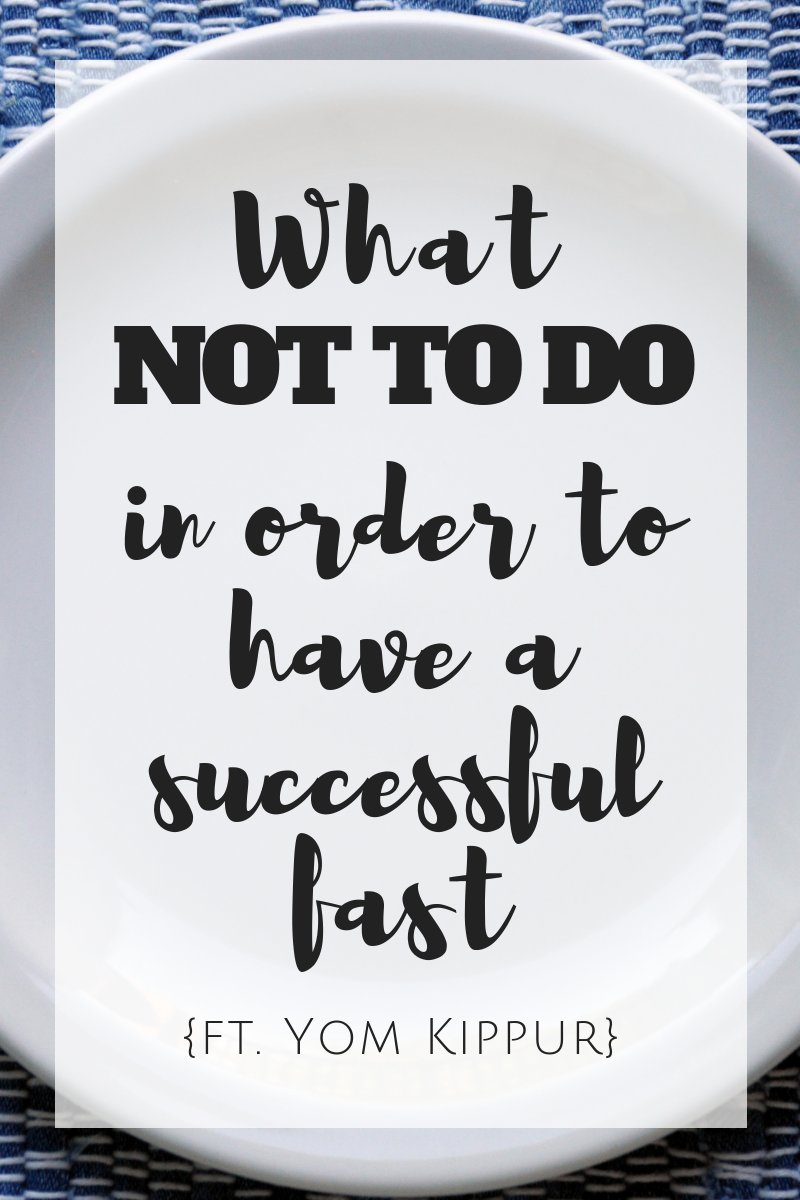With Yom Kippur approaching, and the impact of this long day of fasting and prayers, we want to dedicate today’s post to this topic: What NOT TO DO in order to have a Succesful Fast? I mean, like Really!!

When I started fasting for kippur I genuinely thought I just needed to put my mind “into it”. At that time I thought “emunah” would be enough to keep me going, then, during the actual fast I experienced the worst headache ever and I realized how tough this could be. How I was supposed to do this for the coming years?! 😱😱 Real reason behind my headaches and first “bad” experience with a long day of fasting? I was unprepared. My food choices were poor prior to the fast, and my water consumption was really low, and this alone affected me A LOT during the fast, so I started to change my habits little by little, specially two weeks to a week before the fast so that I could manage better and the result of the next kippur was really positive. For the upcoming years I did better and better, and now, now, I can really focus on the prayers without headaches or anything in between, and I am going to tell you how I do it.
This is not a complete list, of course. This is my No-No list of what to avoid, what not to do before and after the fast. After reading this you may discovered that some apply to you, or all, or even realized that we forgot something! (In that case you’ll let us know to add it to this list 😎)
Here we go…
No-No #1:
Jumping into the fast without sinking in the idea first
I said before that in my first experience fasting I had a terrible time because I thought it was enough to just put my mind into it and jump into the fast. I was so unprepared… Well, after many years of fasting, obviously this alone was not enough, but it is still a very important part of the fasting experience. You have to meditate in this idea of fasting and visualize you finishing it before it even starts. If you are in some way addicted to certain foods, and there is a good chance that you think about those foods and feel hunted by your cravings, think about what triggers those thoughts and feelings and try to bring other positive thoughts to your mind.
Usually when we crave food is because we “crave” a particular time in our life or a friend, a family member, or this particular food triggers some emotions like love, comfort, etc. If for some reason you have those cravings during the fast, you now know that it is not about the food, it is about the memories around them. If your cravings remind you of a friend or family member, you can make a conscious decision of calling them before or after the fast. Differentiating these two, real hunger and cravings, will make a huge difference in terms of how successful you will be during your fasting period.
No-No #2:
Starting the fast Dehydrated
Don’t you EVER start the fast dehydrated! You need to drink a huge amount of water, no kidding!
On the days around the fast (starting 2 to 1 week before) I make the conscious decision to drink a lot (Like a REAL LOT!) of water. It helps with focus, bloating and cravings and it makes you feel better in general. Even though Yom Kippur’s fast is not about “health”, at the end your body will thank you for all this water in your system .
I have found that drinking half my body weight in ounces of water helps me a lot with headaches, hunger and focus. I always start my massive water consumption at least a week before the fast. Even 3 days of massive (literally massive!) water consumption will make a big difference on your fasting day. Of course, consuming tons of water means you may go more than usual to the bathroom but this is just one little downside (if you really are that negative to call this “downside”) comparing to all the benefits you’ll get. And, since many people are partly dehydrated (even without knowing it), all this water will for sure make a positive impact on you overall health.
No-No #3:
Eating like is the end of the world before the fast
If you want to be successful in this fasting endeavor, you need to start reducing your food intake at least a few days before the fast, not eating more!. I know! Your mind may be telling you that you need to “store” as much “food” as you can in order to “survive” but you will probably end up with stomachache, gas, bloating and other symptoms that are never good nor welcome, specially before Yom Kippur. What you really want is to get used to less food so that the day of the fast you don’t miss any food or at least the probabilities or doing so are reduced.
I usually start eating less at least a week before the fast. I have tried many ways, one of them being making a 3-days fruit “fast” that ends on ereb kippur which means I just eat fruits (that also counts towards my water consumption) for 3 days, and the end of this “fast” is the beginning of kippur . Take into consideration that if you are eating just fruits, you need to increase the amounts you eat because fruits have considerably less calories that other foods.
No-No #4:
Not Choosing your food wisely
When you are preparing for a fast, and after the fast, is better you avoid certain foods like fatty foods and junk foods starting days before the fast. Need reasons? We all know these foods are bad for you in general terms, and if you are not going to stop consuming them 100%, at least consider it at this time, previous to Yom Kippur.
One of your goals right before the fast should be to eat enough nutrient dense foods that will keep you full longer and maintain your sugar levels stable long enough so that you finish the fast without cravings, headaches, bloating and things like that, and for that reason is better to limit and even avoid refined carbs and super sweet stuff before and after the fast.
In my experience, when I eat refined carbs before the fast like breads, donuts, pastas, etc, I am more likely to get a headache, maybe stomachache and the worst… cravings!. In the past 10 years or so I have been eating from pasta to chicken soup to vegan food before the fast, and I have found that the best food to eat for me are those with more protein content (meat or plant-based) and less refined carbs; but I would not suggest cheese, because dairy is more comparable to a junk food than a proper nutrient dense food.
Also, and this is kind of obvious, avoid foods that tend to make you gassy. Of course this will vary from one person to another, but some people may find that legumes, dairy products, and certain vegetables like cabbage, onions and garlic make them more likely to get gas, so if you are one of those, avoid these foods completely before the fast.
No-No #5:
Thinking & talking about food during the fast
I don’t understand why, right before Minhah, there is always someone that starts talking about how good his/her mom cooks, or even describing certain foods! (aka “pure torture for everyone else!”)… Going to the synagogue means that you will be very busy with the prayers, but if at any point in between services you feel like this, thinking and even salivating while remembering your favorite foods’; meditate or grab a book and read something positive. Even your siddur’s footnotes would be a good thing to read at such time 😉
No-No #6:
Overwhelm your shrunk stomach with a marathon of food
All of these tips can lead you to have a more meaningful fast, so, don’t ruin everything you’ve done until now by eating 2 kilos of meat, a whole pizza or a dozen donuts after the fast is finished. You literally need to eat like a poor man after the fast. Try to be prepared and have a simple meal like some root vegetables soup or chicken soup ready at home. Hot chamomile, dandelion, ginger, lemon or mint tea are also great options to have as soon as the fast finishes. Try not to rush into food and, if for any reason you are going to eat something like pasta or rice to break the fast (we cannot control the universe after all) try to eat much less than what you normally eat. Remember that you just had 26 or so hours without food and water. DO NOT overwhelm your shrunk stomach with a marathon of food.
Well, well, this is all for today. Tell us, is there any other tip you put into practice in order to prepare for the fast? Let us know in the comment section below or head over instagram or pinterest and let us know there 🙂
Tizké leshanim rabboth!
